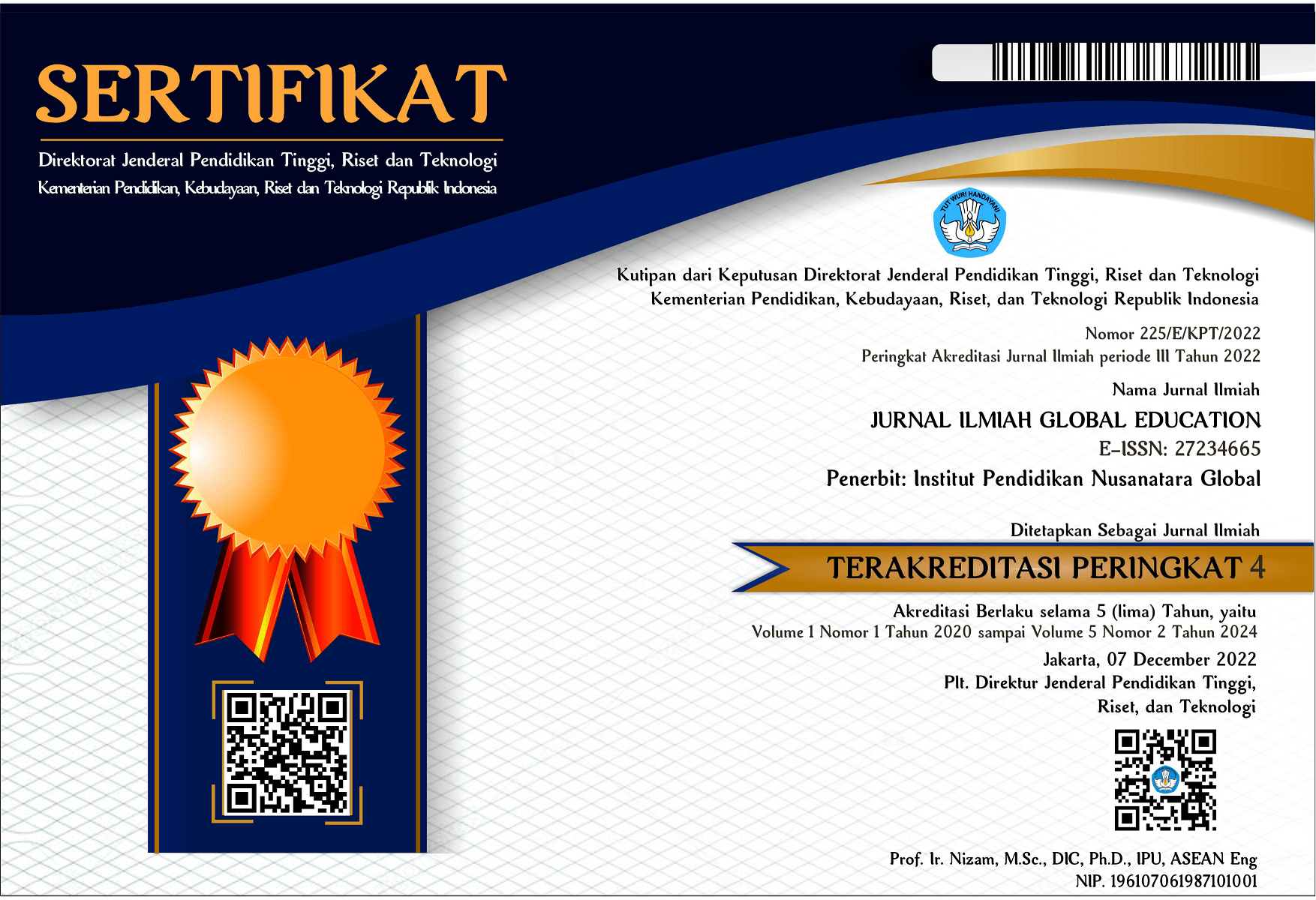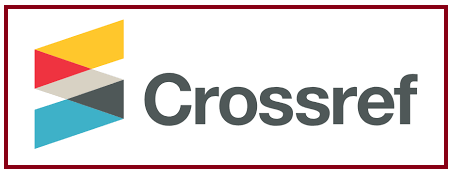Pengaruh CEO Narcissism Terhadap Manajemen Laba dengan Koneksi Politik Sebagai Variabel Moderasi
DOI:
https://doi.org/10.55681/jige.v5i1.2486Keywords:
CEO narcissism, political connections, earnings management, influenceAbstract
The primary objective of this research is to obtain empirical evidence regarding the impact of CEO narcissism on earnings management, taking into account political connections as a moderating factor. The study focuses on state-owned enterprises listed on the Indonesia Stock Exchange during the period 2017-2021. The selection of samples in this study utilizes purposive sampling, yielding a sample size of 15 state-owned companies. The analytical approach involves multiple linear regression. The findings suggest that: (1) CEO narcissism positively influences earnings management, and (2) the presence of political connections as a moderating variable does not significantly alter the impact of CEO narcissism on earnings management.
Downloads
References
Agrawal, A., & Knoeber, C. R. (2001). Do some outside directors play a political role?. The Journal of Law and Economics, 44(1), 179-198.
Al-Dhamari, R., & Ismail, K. N. I. K. (2015). Cash holdings, political connections, and earnings quality: Some evidence from Malaysia. International Journal of Managerial Finance, 11(2), 215-231.
Alhmood, M. A., Shaari, H., & Al-dhamari, R. (2020). CEO Characteristics and Real Earnings Management in Jordan. International Journal of Financial Research, 11(4), 255–266. https://doi.org/10.5430/ijfr.v11n4p255.
Almuzaiqer, M. A., Fatima, A. H., & Ahmad, M. (2022). Royal Family Members and Corporate Governance Characteristics: the Impact on Earnings Management in Uae. International Journal of Business and Society, 23(2), 689–713. https://doi.org/10.33736/IJBS.4834.2022.
Amernic, J. H., & R. J. Craig. (2010). Accounting as a Facilitator of Extreme Narcissism. Journal of Business Ethics, 96(1), 79–93. https://doi.org/10.1007/s10551-010-0450-0.
Antonius, R., & Tampubolon, L. D. (2019). Analisis penghindaran pajak, beban pajak tangguhan, dan koneksi politik terhadap manajemen laba. Jurnal Akuntansi, Keuangan, dan Manajemen, 1(1), 39–52. https://doi.org/10.35912/jakman.v1i1.5.
Braam, G., Nandy, M., Weitzel, U., & Lodh, S. (2015). Accrual-based and real earnings management and political connections. International Journal of Accounting, 50(2), 111–141. https://doi.org/10.1016/j.intacc.2013.10.009.
Buchholz, F., Lopatta, K., & Maas, K. (2020). The Deliberate Engagement of Narcissistic CEOs in Earnings Management. Journal of Business Ethics, 167(4), 663–686. https:// doi.org/10.1007/s10551-019-04176-x.
Capalbo, F., A. Frino, M. Y. Lim, V. Mollica, R. Palumbo. (2018). The Impact of CEO Narcissism on Earnings Management. A Journal of Accounting, Finance, and Business Studies 54 (2), 210-226. https://doi.org/10.1111/ abac.12116.
Chaney, P. K., Faccio, M., & Parsley, D. (2011). The quality of accounting information in politically connected firms. Journal of Accounting and Economics, 51(1–2), 58–76. https://doi.org/10.1016/j.jacceco.2010.07.003.
Chatterjee, A., & Hambrick, D. C. (2007). It's all about me: Narcissistic chief executive officers and their effects on company strategy and performance. Administrative science quarterly, 52(3), 351-386.
Chen, J., Z. Zhang. M. Jia. (2019). How CEO narcissism affects corporate social responsibility choice? Asia Pacific Journal of Management.
Chi, J., J. Liao, & X. Chen. (2016). Politically Connected CEOs and Earnings Management: Evidence From China. Journal of the Asia Pacific Economy, 21(3), 397–417. https://doi.org/10.1080/13547860.2016.1176644.
Das, R. C., Mishra, C. S., & Rajib, P. (2018). Firm-specific Parameters and Earnings Management: A Study in the Indian Context. Global Business Review, 19(5), 1240–1260. https://doi.org/10.1177/0972150918788748.
Dechow, P., W. Ge, dan C. Schrand. (2010). Understanding earnings quality: A review of the proxies, their determinants and their consequences. Journal of Accounting and Economics, 50(2–3), 344–401.
Faccio, M. (2006). Politically connected firms. American economic review, 96(1), 369-386.
Field. E, Pande R, Papp J, Rigol N. 2013. Does the classic microfinance model discourage entrepreneurship among the poor? Experimental evidence from India. Am Econ Rev; Vol: 103(6):2196-2226.
Garcia-Meca, E., M. Ramon-Llorens, dan J. Martinez Ferrero. (2021). Are narcissistic CEOs more tax aggressive? The moderating role of internal audit committees. Journal of Business Research 129, 223-235.
Ham,C., M. Lang, N. Seybert., S. Wang. (2017). CFO narcissism and fnancial reporting quality. Journal of Accounting Research 55 (5), 1089–1135. https://doi.org/10.1111/1475-679X.12176
Hambrick, D.C. & P.A. Mason. (1984). Upper echelons: The organization as a reflection of its top managers. Academy of management review, 9, 2, 193-206.
Kontesa, M. dan R. Brahmana. (2021). Narcissistic CEOs and their earnings management. Journal of Management and Governance 25, 223–249.
Kontesa, M., Brahmana, R., & Tong, A. H. H. (2021). Narcissistic CEOs and their earnings management. Journal of Management and Governance, 25(1), 223–249. https://doi. org/10.1007/s10997-020-09506-0.
Lin, F., S. W. Lin., & W. C. Fang. (2020). How CEO narcissism affects earnings management behaviors. North American Journal of Economics and Finance, 51, 101080. https://doi. org/10.1016/j.najef.2019.101080.
Nguyen, H. A., Lien Le, Q., & Anh Vu, T. K. (2020). Ownership structure and earnings management: Empirical evidence from Vietnam. Cogent Business and Management, 8(1), 37– 52. https://doi.org/10.1080/23311975.2021.1908006.
Olsen, K. J., Dworkis, K. K., dan Mark Young, S. 2013. CEO narcissism and accounting: A picture of profits. Journal of Management Accounting Research, 26(2): 243–267. https://doi.org/10.2308/jmar-50638.
Plöckinger, M., Aschauer, E., Hiebl, M. R. W., & Rohatschek, R. (2016). The influence of individual executives on corporate financial reporting: A review and outlook from the perspective of upper echelons theory. Journal of Accounting Literature, 55–75. https://doi.org/10.1016/j.acclit.2016.09.002.
Raskin R.N., & C. S. Hall (1979) A narcissistic personality inventory. Psychological Report 45(2):590. https://doi.org/10.2466/pr0.1979.45.2.59
Rijsenbilt, A., & H. Commandeur. (2013). Narcissus Enters the Courtroom: CEO Narcissism and Fraud. Journal of Business Ethics, 117(2), 413–429. https://doi.org/10.1007/s10551- 012-1528-7.
Sadiq, M., & Othman, Z. (2017). Earnings manipulations in politically influenced firms. Corporate Ownership and Control, 15(1), 65–71. https://doi.org/10.22495/cocv15i1art6.
Shahzad, F., Rauf, S. A., ur Rehman, I., Saeed, A., & Al Barghouthi, S. (2017). Earning management strategies of leveraged family and non-family controlled firms: An empirical evidence. International Journal of Business and Society, 18(Special Issue 3), 503–518.
Uygur, O. (2013). Earnings management and executive Compensation/: Evidence from banking industry. Banking & Finance Review, 5(2), 33–54.
Wati, L. N., Ramdany, R., & Momon, M. (2020). Benefits and Costs of Political Connection, Evidence in Indonesia. Jurnal Khatulistiwa Informatika, 4(2), 191-196.
Downloads
Published
How to Cite
Issue
Section
License
Copyright (c) 2024 Muhammad Bayu Saputra, Dona Primasari

This work is licensed under a Creative Commons Attribution-ShareAlike 4.0 International License.













